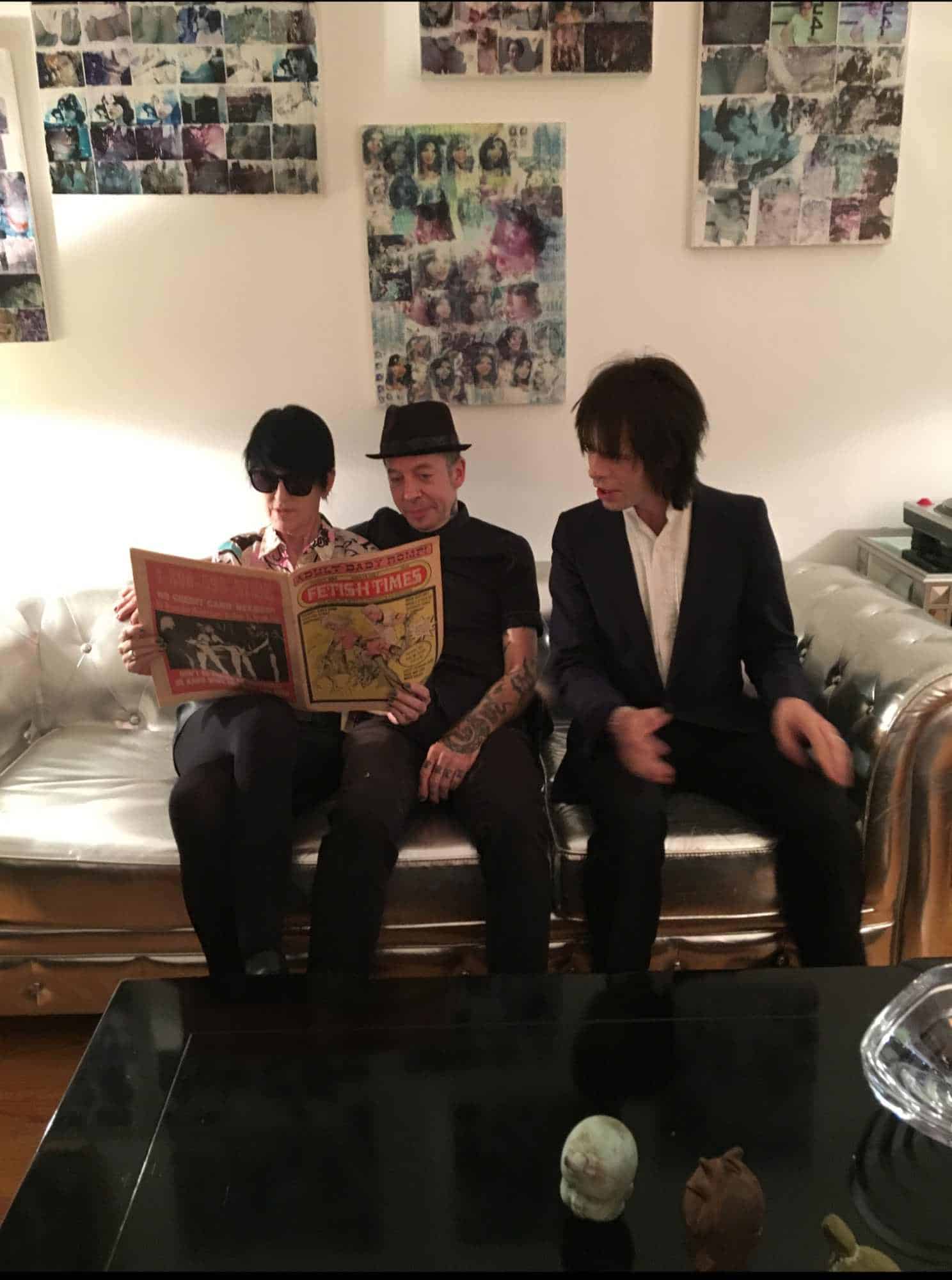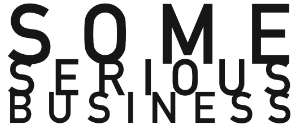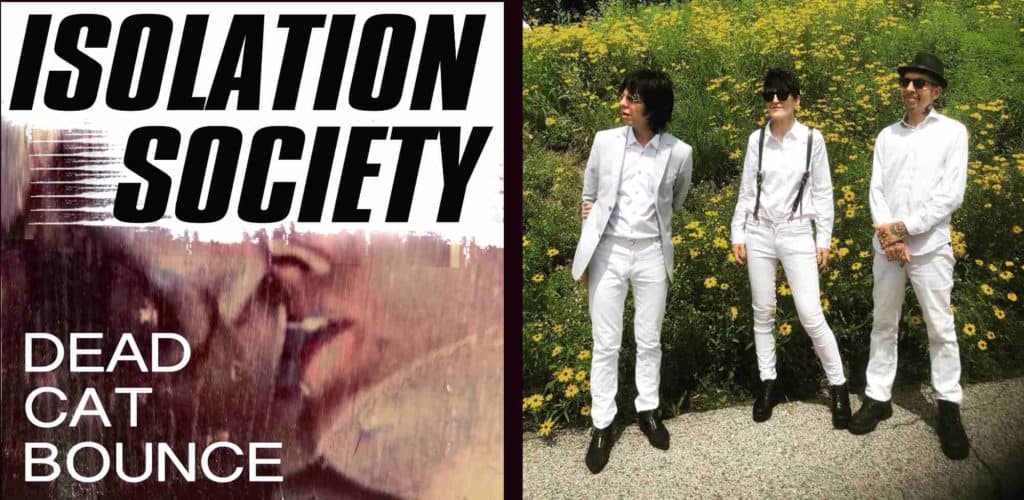Isolation Society is a three-piece band from New York City, with Julie Hair on bass, samples, and vocals; Richard Hutchins on drums; and Ian Wilson on guitar and vocals. Their content-driven songs utilize samples pulled from popular culture, and lyrics about the human condition and personal politics. Dead Cat Bounce* is out now on Burger Records.
Isolation Society is a modern-day gothic New York City noise band that foreshadowed our current reality of social distancing and isolation. I love the way Julie, Ian, and Rich combine drum-and-bass grooves, and incongruous guitar and vocal harmonies, with samples and disturbing lyrics to create pensive pop songs. The opening accusations of “Decisions”, the layered vocals and subway sounds of “Moisture”, and the chaotic coronavirus media musings of “Foot Fetish” incorporate samples from the noise of our lives. Isolation Society references art and popular culture while questioning the status quo. I’m a big fan of that.
The trio have bona fide connections to well-known seminal New York City bands from the 80s and 90s, including Live Skull, 3 Teens Kill 4, and The Star Spangles…but this ain’t no history lesson or nod to the past. This record, Dead Cat Bounce, is a consummate ride into the present, with 10 discrepant tracks. Have a listen, and pick your poison.
What event or factor in your life has been the most pivotal in your decision to become an artist?
Richard: I wanted to play rock and roll but I didn’t feel like I had any natural ability. One day while jamming [on bass] with my friends, I sat down at a drum kit, and I could actually play. I enjoyed drumming from the minute I first sat down. I never had even held a pair of drumsticks before. At that point I knew that is what I wanted and needed to do.
Julie: Going to art school, because I literally couldn’t think of anything else to do. And moving to New York I realized that space was a commodity and that visual art-making takes lots of space. I decided that music was something I wanted to do, partly because it didn’t take up as much space.
What artist do you consider most influential to your ongoing development as an artist?
Julie: Georgia O’Keefe is one of my faves. What she created out of nothing in the middle of the desert in New Mexico was ahead of its time. She is great example of an artist whose life was as radical as her work. I try to remember that how I live my life is always going to be my biggest artistic and political statement.
Richard: My development is always influenced by how drummers did it before me. Someone I was listening to 30 years ago may only now influence what I am working on. It runs the gamut from Hal Blaine (before I knew who he was) to Charlie Watts, Ringo, Bonham, Paul Cook (of Sex Pistols), Topper Headon (of The Clash), and Budgie. Also hardcore drummers, and later Bob Bert (of Sonic Youth, etc.), Dave Rat (of Rat at Rat R), and others. How I approach dynamics and arranging is influenced by all the music I have listened to my entire life.
What has been the most significant challenge you’ve faced and overcome to continue your art practice?
Ian: Addiction. And boredom.
Julie: Addiction.
Richard: Other than realizing it’s not easy, and I’m not that good? Addiction.
What one sentence do you hope describes how your art practice will be recorded in history, and why?
Richard: Bloody rich, played well with others.
What project of yours do you personally consider most satisfying, and why—regardless of external support or accolades?
Julie: I’d have to say 3 Teens Kill 4, because of the people I got to work with and be influenced by. I still hang on to ideas we held, like not wanting to have a front person…no cult of personality. Also that substance trumps style, and the party line is there is no party line.
Ian: Isolation Society. This one. This is the first time I am doing what I want musically, and not compromising.
Do you have a relationship with the distant future—in other words, are you making artwork that bears a message or impact for coming generations?
Julie: I definitely would like for our work to hold up and be looked at in the future. We’re talking about personal politics, our lives, our mental health, the way we treat each other, and the way we occupy the world. We reinterpret popular culture when we take audio samples from social media, 911 calls, and mainstream television, and put them into our music. This different context zooms in on an alternate point of view into life at this moment, which in turn counters the original context. We are writing our own history.
What unchangeable fact has been most frustrating to you as an artist?
Ian: I’m always trying to get out of the vacuum I put myself in.
Julie: Finding that the best performances are not always on stage. And realizing that a lot of people are not comfortable having conversations about creative differences during the process.
Richard: That my skill set is limited.

How would you describe your ideal relationship with other artist colleagues?
Ian: I could never be a singer-songwriter. I like discovering what people will bring to the table that I can’t.
Julie: I want to work with other people in an environment that is comfortable enough for everyone to let their hair down and take chances without being afraid of judgment…where things happen that I can’t predict and inspire me. Virtuosity is not as important as being good in a crisis or having a good sense of humor.
Richard: I’m an accompanist. My art is about relationships with other artists. I’m not interested in solo drumming. Beyond making music, I like helping other artists and musicians in random ways for no good reason. I also like it when someone does that for me.
Who or what are you speaking to or with in your current work? Who or what would you like to speak with in your art in the future?
Julie: I’m doing it for the Akashic records.
Describe the greatest gift someone has given to you that invigorated your artistic expression?
Ian: My first guitar.
Richard: When my friend’s brother let me play his drums, and I drummed for the first time. I later bought his drums as my first kit. Without that I do not know if or when I would have discovered playing drums.
Julie: I think for me when I was thinking about picking up an instrument for the first time in my life in my twenties. I was a visual artist, and I didn’t think I could do music. A woman musician friend of mine helped me understand that it’s all the same sensibility.
Are you more interested in the universal or the individual? How important is it to you whether you express yourself as a unique person, or rather add your voice to a collective conversation?
Richard: I’m into the overlap. My expression is my individual voice into a collective, so I’m interested in both, I guess. I know that sounds like bullshit, but for me as an artist, it’s about connecting. Every artist has their own unique vision or perspective. How do I connect?
Ian: As an individual, I like to add to the collective.
Julie: I want to add my voice to the conversation. It’s also important to me, in this thing that we’re doing—playing music, making art, and collaborating—that women’s voices are heard. The playing field is still very uneven. I’ve worked with men who think they are gender-blind because their sexism is so ingrained they just can’t see it.
*The Dead Cat Bounce Trade is a short-term, event-driven, swing trading strategy that exploits sudden price decreases on publicly listed stocks.

